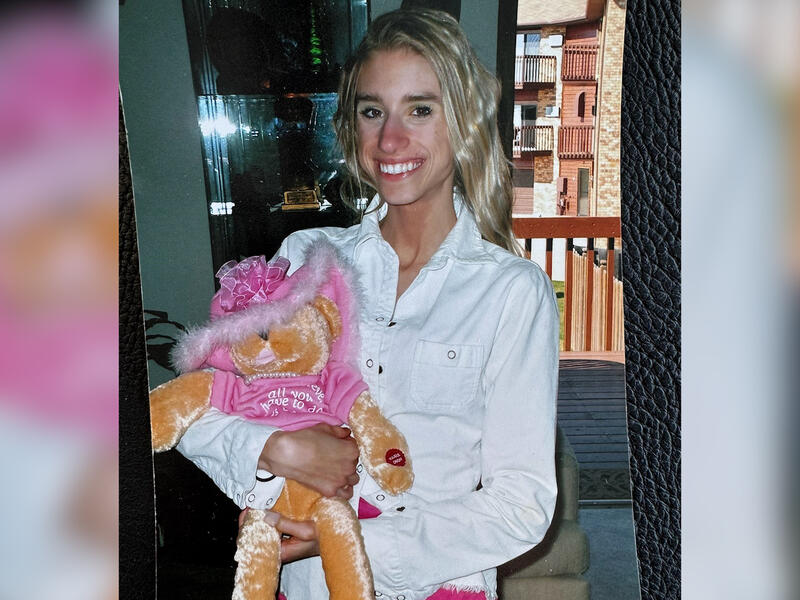Looking back at pictures of her younger self, Sara Bond has mixed emotions.
“It’s almost hard to look at them because I just remember these times, and I’m so grateful to be healthy today. I just think how far that I’ve come,” said Bond.
They are a reminder of her struggle with anorexia, an eating disorder which she says took control of her life.
“I spent my valuable time obsessing over calories consumed and when I could work out. And it really robbed me of my days,” Bond said.
Searching for control
Bond says multiple factors led to her eating disorder, which began while she was attending Minot State University. They include comments about her weight, a sense of loss after graduating high school, and feeling like she had no control of her career path.
“I began restricting my eating habits and becoming very obsessive about working out,” Bond said. “I’ve always been a very high achiever and cared deeply about my grades and was trying to balance being in all these organizations and events and spending time with friends, and so it was just overwhelming. I continued that path of turning to food and exercise as something I could control.”
Eventually her eating disorder led to serious health concerns.
“Lightheadedness, low blood pressure, heart palpitations, chest pain, anemia, loss of menstrual cycle, and I even had some kidney problems that I was going through as well,” Bond said.
“I was 65 pounds at my lowest, and I was barely alive. I remember my mom, she would come in and check on me at night to make sure I was breathing.”
One day at the student center, Bond fainted. An ambulance took her to the hospital in Minot, where her mother helped make the decision to transfer her to the Sanford Eating Disorders and Weight Management Center in Fargo.
“That was the first time that I had hope because I really deeply wanted my life back. I was at that point that I was so afraid. I hate to admit that it took me to that point. I was so afraid that I was going to lose my life,” Bond said.
Staying at the eating disorders clinic
Dorian Dodd, Ph.D., is an eating disorder psychologist who also runs a research program at the Sanford Eating Disorders clinic in Fargo. She says the clinic is an oasis for patients who may not have help in their own hometowns. The nearest clinics providing similar services are in Minneapolis and Denver.
“We are one of the only inpatient ones that takes patients as severe as we do, and one of the only inpatient units that is not for-profit and accepts Medicaid,” Dr. Dodd said. “So we end up getting people from all over the country because of that.”
Video: Take a tour of the Sanford Health eating disorders inpatient and partial hospital program
Dr. Dodd says patients like Bond require care in multiple disciplines to help wrest control back from their eating disorders.
“Many of our patients are also dealing with anxiety, depression, post-traumatic stress disorder. So there’s often comorbidities psychologically,” said Dr. Dodd. “We have our psychiatrists, we have our nutritionists, we have our therapist, and then we have additional team members that run groups for our unit.”
Dr. Dodd says a major problem with diagnosing eating disorders is that they are often happening in secret. So family and friends should be on the lookout for certain telltale signs.
“Significant weight loss, difficulty around food, never seeing the family member eating. They’re always saying, like, ‘Oh, I already ate,’ or ‘I’m going to eat later. I’m not hungry,’” said Dr. Dodd. “Those are some of the main things to look for. Compulsive exercise can be another one. Or always kind of excusing oneself to the bathroom after a meal.”
‘Full circle’ recovery
These behavior patterns are a big reason why, according to the National Institutes of Health, eating disorders have some of the highest mortality rates of any mental health disorder. It’s also a big reason why Bond is so willing to share her story.
“It is something that people just don’t talk about, and there sometimes is that stigma around it, which is very unfortunate,” said Bond.
Dr. Dodd agrees, but she says the more discussion there is, the better.
“It’s wonderful that there’s this expanded awareness because early treatment is one of the best indicators for a good outcome,” said Dr. Dodd.
For Bond, her outcome includes a job in community relations at Sanford Health in Fargo, in an office just across the street from the clinic.
“It’s really fulfilling,” Bond said. “And I’m so grateful. It’s really a full circle moment for me to be able to serve at an organization that truly saved my life.”
Resources for you
If you think you may be struggling with an eating disorder, the first step is to see your doctor. A health assessment can help patients understand how eating disorders affect their physical health. Decisions about the level of care can differ for each patient.
In addition to working with your doctor, Sanford Health does have eating disorder specialists and clinics throughout the rural health footprint. Find a location near you.
Learn more
- Think someone has an eating disorder? Here’s what to do
- Eating disorders vs disordered eating: Differences & dangers
- Eating disorders and young athletes
…
Posted In Behavioral Health, Fargo, Nutrition, Rural Health

